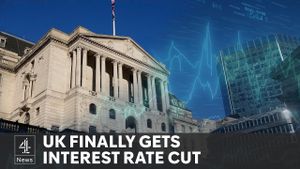Residents of the Royal Borough of Windsor and Maidenhead are bracing for what could be one of the steepest council tax hikes seen, with plans under consideration to boost the rate by as much as 25%. The proposed increase, which aims to alleviate the council’s financial woes, has ignited fierce debate among local residents, many of whom are feeling the strain of already rising living costs.
The council's draft budget includes requests for both permission to raise council tax beyond the standard 5% limit and substantial loans, reflecting severe fiscal distress. According to the proposed plan, local authorities need to secure government consent or hold a referendum to permit such increases. For RBWM, the request to raise taxes includes asking for an additional 20% on top of the already proposed 4.99% hike. This decision stems from what officials claim are longstanding financial troubles, including past accounting errors totaling approximately £30 million.
Mother-of-three Tara Wise, 35, voiced her exasperation over the potential increase, stating, "It’s awful. It’s unfair and it just makes living harder. Everyone’s already struggling as it is." Wise, like many others, expressed concerns about what services the council plans to improve with the raised funds, mentioning poorly maintained roads and potholes as examples of where existing tax revenues are inadequately utilized. "They haven’t really justified it," she added, reflecting the sentiments of many who feel the proposed increase lacks transparency.
Local pensioners, like Steven Levene, 71, are particularly concerned, facing the harsh reality of financial constraints after losing the winter fuel allowance. For Levene, the council tax hike, which could amount to £450 extra annually, compounds his financial burden. "If you take the rise and the loss of the fuel allowance, that's £600, which is significant on my pension," he said, also voicing his frustration over the local council's management of funds.
Others participating in the debate include Narinder Singh, 45, who fears the hike will force him to make cutbacks on essentials. "Increasing council tax with the cost of living is inappropriate. There’s kids to feed and rising costs like gas and electric. It’s just not feasible," he said.
The political backdrop to these financial decisions is complex, with RBWM currently under Liberal Democrat leadership, which has faced criticisms for perceived mismanagement. Local Tory councilor Sally Coneron has attacked the council’s handling of budgetary matters, stating the public shouldn't be forced to bear the consequences of the council's failures. "The residents of the Royal Borough should not be forced to pay the bill for the persistent weak control and political failure of the Liberal Democrat leadership," she commented.
Experts warn the potential tax increase is not unique to RBWM. The pressure on local councils has intensified across England, with many considering similar actions to stave off bankruptcy. Several councils, including those under Tory and Labour control, are also seeking permission to exceed the council tax rise cap, primarily to address historical funding deficits and rising operational costs linked to social care and infrastructure.
Economics professor Tony Travers noted, "The government is bound to let some councils breach the 4.99% cap because it’s the least worst option." Jonathan Carr-West, head of the Local Government Information Unit, echoed concerns, emphasizing the dire financial realities confronting local authorities and the inevitability of some councils needing to request higher taxes to avoid insolvency.
Meanwhile, local sentiment continues to sway toward opposition against the proposed increases. Residents are discussing protests, including withholding council tax payments as forms of dissent. Rose Gosztonyi, 29, remarked on the impending difficulties faced by households already stretched thin: "It’s just sort of adding more and more, and the minimum wage isn’t increasing to match these costs. People are going to struggle to pay their bills."
Petitions against the proposed hikes are surfacing, with some residents voicing skepticism about their effectiveness. Historical grievances about council mismanagement have led pensioners like Levene to feel frustrated. "They've raised taxes before, and I never see the improvements they promise. Why should I believe it’ll be different this time?" he asserted.
While many shared their grievances, some also called for solutions, questioning the need for expensive projects when basic infrastructure remains neglected. "We need our streets fixed first, instead of funding monuments nobody cares about," Singh articulated, illustrating broader concerns about council priorities.
Conclusion: The situation over the proposed council tax hike reflects the deep-seated challenges facing local authorities, balanced precariously between financial survival and maintaining public trust. With calls for greater accountability and transparency, residents await the government’s decision on whether to allow councils, like RBWM, to enact these significant increases amid growing economic pressures and dissatisfaction stemming from years of local financial mismanagement.



